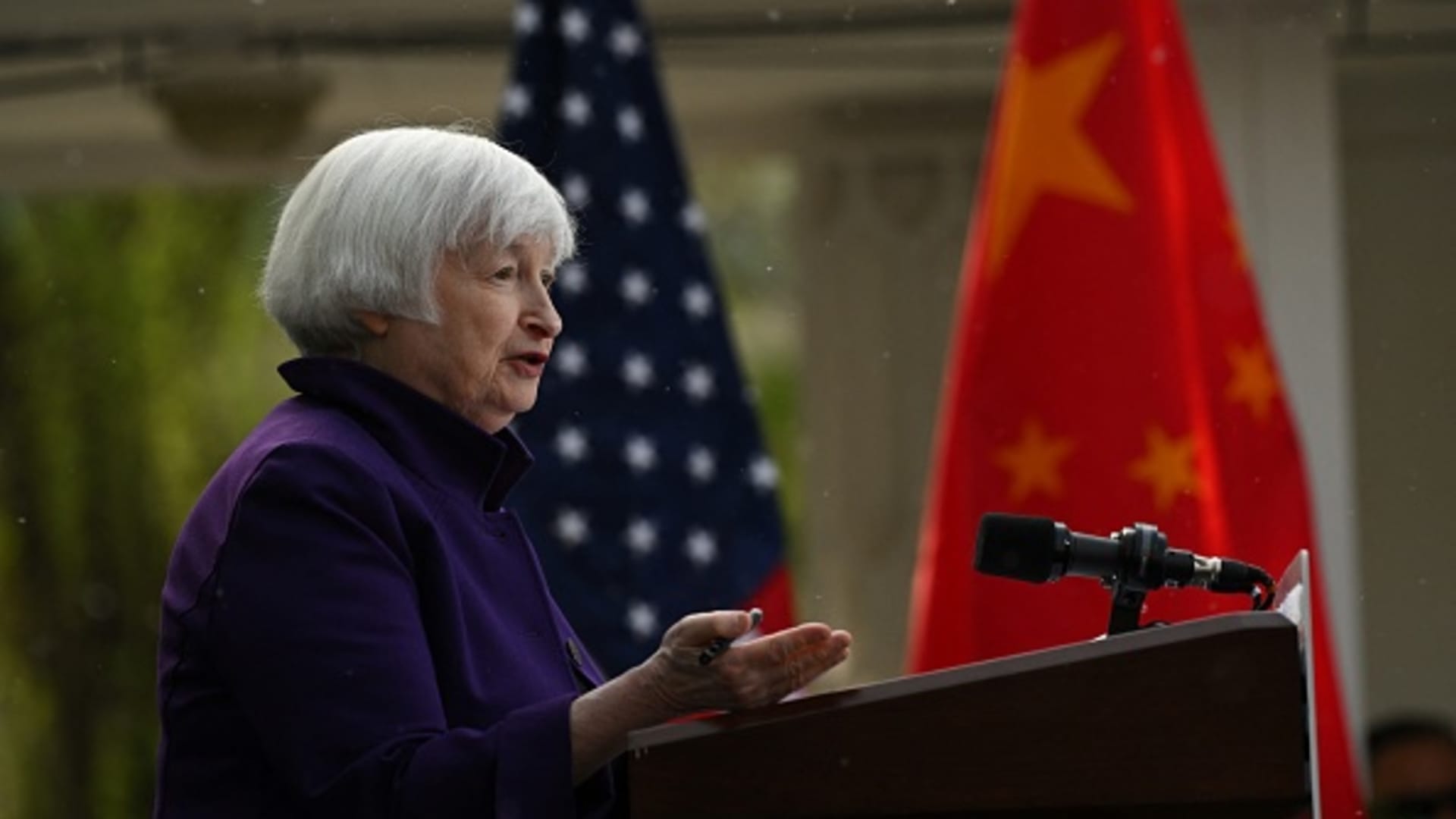Products You May Like
BEIJING — U.S. Treasury Secretary Janet Yellen said Monday that future discussions between the U.S. and China will focus on Beijing’s need to change its policy on industry and the economy.
“We intend to underscore the need for a shift in policy during these talks — building on the over two hours I spent on this topic with the Vice Premier last week,” she said in prepared remarks for a news conference Monday, as she wrapped up the fourth and final full day of her trip to China.
She arrived in Guangzhou on Thursday and is set to depart Beijing on Tuesday.
Yellen said her conversations with Chinese officials during the trip discussed plans Beijing had for its economy, but she did not elaborate. Yellen also declined to share what tools the U.S. might use to prevent China’s industrial policy from resulting in the loss of American jobs.
She noted U.S. conversations with the Chinese would continue later this month at the International Monetary Fund and World Bank Group spring meetings in Washington, D.C.
China’s industrial overcapacity — or excess production of goods that undercuts global competitors on price — has increasingly become a point of international concern. Other countries claim such production is often heavily subsidized.
China’s commerce minister said during a trip to Europe that accusations of “overcapacity” are “groundless” and that innovation, not subsidies, drove China’s EV industry.
In contrast to other countries’ focus on the impact of Chinese overcapacity on global trade, Beijing’s oversupply concerns tend to focus on the deflationary aspects, detriments to banking sector health and local governments’ fiscal stress, said Yue Su, principal economist for China at The Economist Intelligence Unit.
“We anticipate further anti-subsidy and anti-dumping investigations on Chinese manufacturing to take place throughout the remainder of the year, particularly as inflation becomes less of a concern for many developed economies,” Su said. “These investigations may extend to Chinese overseas factories, including those in ASEAN countries.”
A call to boost domestic demand
When asked about potential solutions, Yellen pointed to how China could boost domestic demand relative to supply by adding support for retirement or children’s education.
High costs of living, including housing and health care, have encouraged many Chinese to save rather than spend.
Yellen acknowledged that efforts to reduce industrial overcapacity or increase domestic demand would not be resolved quickly.
“This is a matter that we have discussed over more than a decade in China,” she told reporters.
Consumer demand in China didn’t rebound from the pandemic as quickly as many analysts had expected. In contrast to governments in the U.S. and Hong Kong, Beijing did not issue stimulus checks, but instead focused on cutting business taxes and fees.
National security talks
China has also sought to bolster its technological capabilities in the face of growing U.S. restrictions on how Chinese companies can access that tech.
Both Washington and Beijing have increasingly cited national security as the reason for new measures.
Yellen on Monday said both sides exchanged information on the use of economic tools in national security, and should continue to do so. “We are committed to no surprises,” she said.
During her trip, Yellen met with top Chinese officials including Premier Li Qiang in Beijing and Vice Premier He Lifeng in Guangzhou.
“Over the past year, we have put our bilateral relationship on more stable footing,” Yellen said in prepared remarks for her meeting with Li on Sunday.
“This has not meant ignoring our differences or avoiding tough conversations,” she said. “It has meant understanding that we can only make progress if we directly and openly communicate with one another.”
In a readout from China, Li said Beijing hoped the U.S. would abide by market economy norms and avoid politicizing trade issues. He said the development of China’s new energy industry will make important contributions to global carbon neutrality efforts.
The U.S. and China agreed to “intensive exchanges on balanced growth in the domestic and global economies,” according to a Treasury readout after Yellen’s meetings with Vice Premier He.
The two countries also agreed to “start Joint Treasury-PBOC Cooperation and Exchange on Anti-Money Laundering to expand cooperation against illicit finance and financial crime,” the readout said.
The Chinese side did not explicitly mention such agreements, but said both sides planned to maintain communication. Beijing also “expressed serious concerns” about U.S. trade restrictions.
The Chinese readout described the talks as “constructive,” and noted conversations about “balanced economic growth,” “financial stability” and “anti-money laundering.” That’s according to a CNBC translation.
The U.S. Treasury secretary also met Minister of Finance Lan Fo’an, the mayors of Beijing and Guangzhou, representatives of U.S. businesses, and professors and students at Peking University during the visit.
